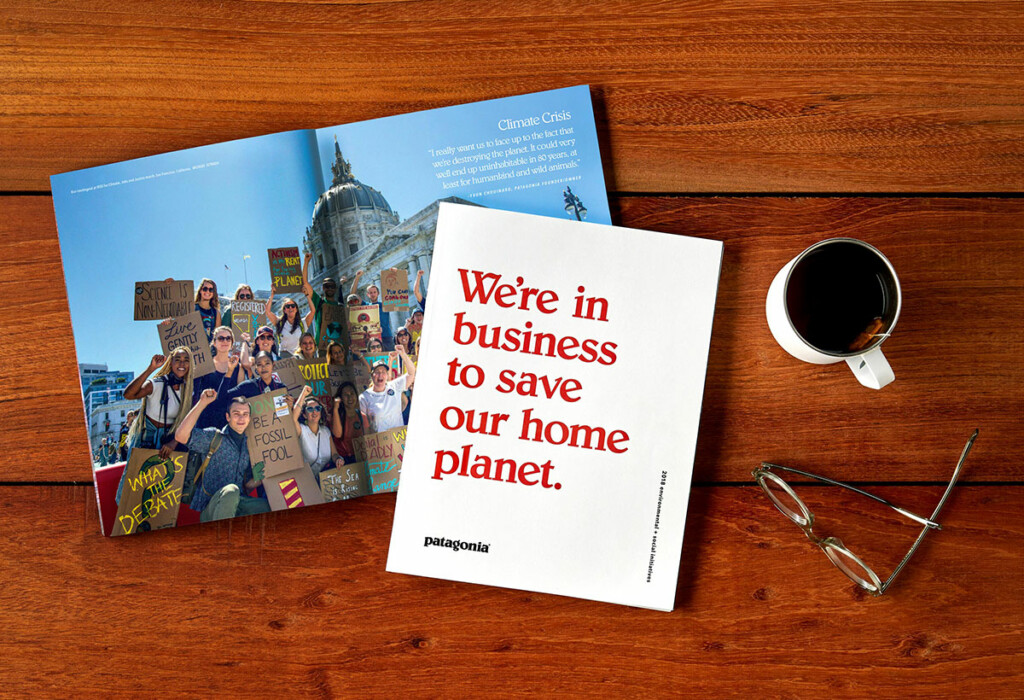The new age of business and entrepreneurial activism
When asked to think of activists, how many of us would imagine businesses? Entrepreneurial activism may not be today’s mainstream, but there are plenty of signs it’s a growing force for the future. Here global food futurist, Mike Lee explores how companies can better measure impact and increase the outcomes for people and planet – not just profit.
 Photo by Miha Rekar on Unsplash
Photo by Miha Rekar on Unsplash
True activism is honorable, necessary, and not for the faint of heart. In history, the activists who have made enduring impact did so through sacrifice and full-throated dedication to their cause. Mahatma Gandhi. Martin Luther King Jr. Sojourner Truth. The list goes on.
As an idealist, one would hope for a world where everyone met this high bar and became an activist. But as a pragmatist, one recognises that real behaviour change followed by sustained discipline is hard to accomplish across the masses.
It is neither practical or beneficial to imagine everyone in society to become an activist. An activist company must find a way to align the goals of their mission with the goals of their customers. Excluding the minority of consumers who have the luxury and wherewithal to consistently vote with their dollar and only support companies who have an altruistic mission, most people just need to make sure they and their families are safe and have basic needs met.
*Altruistic: selfless behaviour to benefit others, at the potential risk or cost to oneself
Humans are hard-wired for self-preservation first. And when all those selfish needs are being well-met, there is plenty of bandwidth for the average person to focus on how they can help others. Like flight attendants have been telling us for decades, “place the oxygen mask on yourself before helping others”. Without basic self-preservation first, there is no opportunity for the individual to create a positive impact on those around them.
When it comes to leading an activist company, one must contend with the question: “Is it better to get people to do the right thing for a selfish reason rather than not do anything at all?”
Everything is connected to food
If you believe that stopping climate change and improving the health and well-being of societies everywhere are issues worth fighting for, you can tackle these issues by changing how the food industry operates. Food is the only product in history that has a 100% adoption rate within the human race. We are all connected to food, so we’re all connected to the issues that food impacts too.
Agriculture accounts for 11% of global carbon emissions and also employs 23 million people worldwide. Food manufacturers, like Nestle, Danone, Mars, and others, own a significant number of food brands you see on grocery store shelves worldwide. They have an enormous influence on what consumers eat and how producers grow.

Photo by Franki Chamaki on Unsplash
Mass food brands are focused on scale. Gaining enough market share to realise economies of scale is a central tenet of these business models. As such, decisions made by a few people in a global food conglomerate have sweeping effects on how people eat, how farmers grow, and how the health of the planet fares.
Every person on Earth is connected to the food and agriculture system, either directly or via intermediaries like food brands or food service establishments. Yet most consumers behave like passive participants in the food system. Most don’t realise that they most likely are reinforcing a food production system that is often deleterious to the planet and exploitative to those who cultivate the land.
RELATED: Humans of Agriculture speaks with Mike Lee about the future food system
Hedonistic sustainability
The entrepreneurial food activist seeks to give consumers another choice within their food purchases, where people and the planet are well taken care of in the making of that food. These activist companies exist to satisfy the hedonistic needs of the consumer while satisfying a mission to better the world.
Yvon Chouinard, the Founder of Patagonia, one of the best examples of an activist company, astutely notes that: “Some customers buy Patagonia products because they like our values. But that’s only 10% of the people. The other 90% buy our products because they like the color or they like the style.”

Selling products can be a way to advance an altruistic goal, but supporting that goal is not a substitute for the product meeting a consumer’s needs. Products with inferior quality but a noble goal can win over a consumer for a short time. The consumer feels strongly about an issue and wants to support a company who feels the same way. But quickly, most consumers won’t be satisfied with the product and will find alternative ways to support their cause and other products that meet their needs.
Take the rise of plant-based burger “meat” over the past decade. The idea of a veggie burger is not new – they’ve been in our grocery stores for a long time and were mainly for consumers who are self-motivated vegetarians or vegans and will seek these products out. To meat eaters (and maybe some vegetarians) the taste of these vegetable burgers hardly resembled the real thing, and they languished in the grocery store as a niche item.
RELATED: Synthetic biology and its place in our future food system
Now consider the Impossible and Beyond Burger. These companies have nearly cracked the code on how to manipulate plants into tasting as close as possible to a meat-based burger. They did not choose to go after that vegetarian or vegan consumer as their core customer. They realised that to make their mission of displacing animals from the food agricultural system, they had to meet the needs of the masses in a way that was just as good or better than today’s beef burgers. They didn’t rely on the attractiveness of their mission as a way to win consumers over. Rather, they doubled down on ensuring that their product was as hedonistic as possible, so they could sell enough of them to make their goals a reality.
No matter your opinion about the mission behind plant-based companies like Impossible Foods and Beyond Meat, one must acknowledge that by going after the masses and making sure their taste needs are met, they have a much better chance of succeeding in maximising the uptake of plant-based “meat”.
This example is what I like to call the food version of ‘Hedonistic Sustainability’, a term coined by Danish architect Bjarke Ingels to describe projects where consumers can derive pleasure while advancing some kind of sustainability goal.
Food is emotional and humans frequently make food decisions based on those emotions, not always with logic. Big issues like climate change have emotion in them, but are more characterised by their logical aspects. How can we expect a large portion of the population to always make logical decisions in food, which is something rooted in emotion? The very fact that junk food companies exist and thrive is evidence that the food buying population is not always rational.
The most successful entrepreneurial food activists will find a way to not only make their product the most logical choice, but the most emotional choice. Even better, food companies that can produce food products that derive their main consumer-pleasing characteristics, from the fact that they are grown more sustainably or regeneratively, can show a direct link to how a sustainable growing practice can directly benefit the individual consumer.
RELATED: Sustainable global consumer trends and what it means for farmers
By connecting the hedonism of a product with its altruism, you have access to the masses who may not have any bandwidth or awareness about issues like agricultural sustainability, and you can harness their support of your product to also support your mission. Some of your consumers may not even care about your mission, but through their love of your product, they are still supporting your mission. The ultimate goal for an entrepreneurial food activist is to give people an accessible and inherently rewarding way to support an activist mission.
Sustainable altruism
Producing a food product that delights consumers and supports an altruistic mission is only half the battle. While an activist may live in a world where their mission is the only thing that matters, in business and the financial world, money is still the only thing that matters.
RELATED: Perennial wheats purpose bred for sustainability
This dynamic has been changing, with companies both big and small creating “corporate social responsibility (CSR)” initiatives to promote a range of noble pursuits, but CSR programs and their ilk are merely a band-aid solution. For the most part, these programs are well-meaning but ultimately a bad quarter or year at the company puts these programs at risk of defunding or discontinuing altogether. Time and time again, I’ve witnessed companies who fall short of Wall Street’s financial expectations cut CSR programs and anything else that is not “core to the business”.
RELATED: What is impact investing and why it’s not charity
I don’t blame these companies for doing this. The managers at these companies are doing exactly what they were hired to do, which is to maximise the profits of the company. The problem is not always the people in the company, the problem is the incentive system that the company exists within and reinforces for every employee. Today, companies are evaluated on their ability to create a financial profit. Companies may be able to turn a profit and create a positive impact in the world, but only one of those outputs are reflected in the company’s financial statements.
RELATED: Why agrifood businesses need to value their intangible assets
How does a company measure and value altruistic impact on the same plane as profit? This is a fundamental challenge for any company looking to do good in the world while selling a product. This challenge is especially pronounced in companies that are publicly traded. A multinational food company may be doing amazing things for mitigating climate change, but those impacts almost never affect the share price. This company may have a loyal customer base who is passionate about stopping global warming, but the company’s largest investor may be a hedge fund who is simply investing because of the company’s profitability.
Is the CEO of that company, with his or her compensation largely determined by the value of their stock in the company, prepared to take on an investment in a project that will dampen profitability in the short term but greatly benefit its sustainability goals in the long term? Even if the CEO is willing to sacrifice the value of their own shares in the company to invest in the future, the board of directors or an activist investor can always swoop in and replace the CEO with someone who will optimise the company’s share price, not the long term altruistic benefit it can create.
RELATED: How farmers can claim a global advantage using ‘ground truth’ data
One of the fundamental challenges to overcome for activist companies to survive is to create an incentive structure where everyone involved or invested in the company prioritises the altruistic mission on the same level as its profitability. Meaning, if the company fails in their mission one year but is extremely profitable, everyone associated with this company agrees that it was a bad year for the company. It’s a strange thing to think about because it’s entirely counterintuitive to how we’ve been conventionally taught to evaluate the success of a company.
Measuring the altruistic impact is paramount. Without true and consistent measurement, it’s nearly impossible to determine the return on investment for impact initiatives. Companies like CarbonCloud, HowGood, Quantis, the Bionutrient Food Association, and 60 decibels are just a few examples of companies measuring the health and sustainability of food systems. Profit is easy to measure, but more effort needs to be invested in building up impact measurement so it can one day be just as easily measured.
Shifting corporate culture and governance toward impact optimisation requires a sea change in how businesses operate. But we cannot manage what we cannot measure, and measuring impact is the only way we can evaluate and reward companies for increasing outcomes for people and the planet, not just profit.
Read more of Mike Lee’s opinion pieces about the future of our food system here.
Enjoyed this story? Want to learn more about the Asia Pacific region’s innovative agrifood tech ecosystem? Sign up for our newsletter here and receive fresh stories about global leaders, farmers, startups and innovators driving collaborative change.
